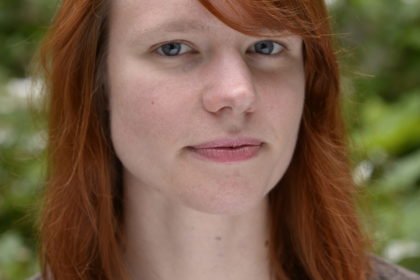MOUSE HOUSE by Amelia Brown


Mouse House
I am visiting my boyfriend’s mother up in Maine, two hours north of our cluttered apartment in Boston. Really, we both are visiting the whole thing: the family, the place. But in another sense, if I look close into a cobwebbed corner of my mind—the one filled with mirrors and hats—really I am visiting my boyfriend’s mother.
In her city, in Portland, there are beautiful houses and there are ugly houses. Susan’s house is beautiful, and I told her so the first time I visited, back in the winter. But I started to get worried about making it sound as if I knew beauty from personal comparison, about getting the compliment wrong. (Do all the houses here have heated floors?) So this time around, I don’t compliment Susan’s house. This time I tell her how much I love her food. I ask her flattering questions: How did she do this? Where did she get that fruit? Is there complicated paraphernalia involved? But what she wants to know is:
“Do you hear that squeaking?”
“Well, yes, as a matter of fact, I do. I thought it was the dryer.”
“The clothes dryer?” she asks.
“Yes, but what is it actually?”
“The mouse,” she tells me.
*
The mouse has been living in her house for so long, she says. For at least a week or maybe longer, maybe two. I marveled, not for the first time, at the efficiency of this beautiful home, at the constant vigilance of this woman for whom two weeks was an eternity of procrastination.
It brought to mind a car of my childhood, the broken-down Mazda that we never got around to removing from the weeds in the backyard where we left it when that last long-neglected repair decided to give out. The Spider Car, named for its new owners, for the day, three years after its abandonment, when my sister opened its door to check in and met only dense webs and heavy, spinning bodies.
“But something has to be done about this mouse,” Susan is saying, “and soon.” I watch her sow the corners of the house with cotton soaked in peppermint oil—the mortal enemy, she tells me, of the mouse nose.
“It terrifies them,” she says. “Too clean. It offends them.”
But this move with the peppermint is only a shot across the bow. Later, in the afternoon as we are sipping tea she has my boyfriend set up one of those traditional mousetraps with the spring and the piece of cheese.
“Put it right there in the corner, Eddie. Right behind the dryer where we heard the squeaking.”
She must have seen me wince, though I thought I’d kept it to myself, because she asks me, “Haven’t you ever seen a trap set before?”
“Of course!” I tell her, but she’s not having it, so I tell her that in my own mother’s house, in the house where I grew up, we would catch things under cups and take them outside. I try to explain that this isn’t based on principles, that none of us is vegetarian or Jain or anything. We just feel guilty.
“Guilty?” she asks. I look over at Eddie, nudging the trap into place with his foot. He looks at me and smiles but also scrunches his eyes in confusion and therefore agreement.
I try to explain that we never discussed the practice, but if I had to put a name to it I’d say we just felt guilty taking initiative, where initiative meant death, when there were so many other things around the house we ignored. But I can tell I’m not doing a great job of saying any of this. So I try again. I tell her that obviously she shouldn’t feel guilty, that her mousetraps are a natural and fair extension of her efficiency, of her home, but I can feel my voice rising into squeaky heights, nasal, pinched, too careful, and so I ask her where in Portland she came by this tea.
The whole mouse issue is forgotten for the rest of the evening, but the next morning, at breakfast, Susan has something to show me. It is a box trap. The mouse is peering out and quivering with that mouse quiver that is either fearful or just a symptom of the way mice breathe.
“So you don’t feel guilty,” she tells me.
I am not sure of what to say except that I’m sorry, that I’m embarrassed she felt like she had to do this for me in her own home. “Thank you,” I say.
“Ok, all right. Let’s let it outside already,” Eddie says.
“Oh well, if we let it out right outside the house, don’t you think it would come back in?” Susan asks.
Eddie remembers that there’s a screen-topped terrarium in the attic and goes to fetch it. I come too, to help him look and to not be left alone.
“She bought me this terrarium when I was a kid,” Eddie says. “Then hamster after hamster after hamster.” He looks behind a box of sweaters.
“Cute,” I say, “classic pet.”
“I wanted a boa,” Eddie says.
We find the terrarium at last, on top of an old dresser. Eddie lines it with a fluffy pink turtleneck from the sweater box, folded into a tight mound.
“Looks cozy!” Susan says, when we bring everything down. “If a little thrown together. We’ll just put it out in the yard, off to the side.”
She takes a crunching corner of toast and says, “Though I wonder what Denise and Jem will think.” Denise and Jem are the next-door neighbors, Susan explains to me. “Eddie? What do you think?” she asks, but he has walked out of the room.
*
That afternoon Eddie and I go to look around the city.
“I just need out for a little while,” he tells Susan.
We sample fudge and taffy at three candy shops and end up at a garage that sells nothing but hand-carved lobsters. In the back of this place, past shelves of painted carapaces, there is a fenced-off workshop where everything is covered in sawdust. Despite the fact that this space is on display, the tools and half-finished lobsters lie scattered in random heaps. The messiness is not in the least bit quaint. I feel close to home for the first time all week.
I say, “What a wreck.”
Eddie puts his arm around my shoulder and crunches me gently. He speaks over the top of my head saying, “I love it.”
“All the sawdust?” I ask.
“Chaos,” he says.
*
When we come back to the house, the terrarium in the yard has been replaced with a large dollhouse. I can see the mouse scrambling up and down the doll staircases. Peering through the mesh that has been stapled across windows and doors, I see a little pink cushioned sofa that the mouse has torn up to build a foam bed in the fireplace.
Susan waves at us from the porch, a teacup in her other hand. “Much nicer, isn’t it? I took it out of storage! Your grandmother’s.”
“I forgot about this.” Eddie sounds wary. “Didn’t we used to play with it?”
“I’d been meaning to fix it up,” Susan says, tapping her lip, “for all the little kiddos to come.” She winks at me, two little coils of steam coming up from the tea to lick around her eyes.
*
Eddie shakes me awake from a dream that night. “You were thrashing around,” he says.
“They were giving me a tour of the car,” I tell him.
“Who was? Which car?” His fingers on my hip are making little Xs.
“They’d made up a guest web for me.”
“Sounds sticky,” he says.
“It was soft,” I say. “It was warm.”
He’s silent for a little while. He’s weighing that, I think. Weighing our own warm rooms back in Boston, the space we’ve abandoned for this short trip. He must be imagining what might come to fill it. In fact, he’s fallen back asleep.
*
Eddie and I spend the weekend with his friend Amy in her apartment one town over. We drink and walk along rocky beaches and sleep on a velvet sectional.
At one point, Eddie brings up the mouse and his mother’s fussing. Amy and he recollect together a time that Susan helped them with a high school English project. She spent a week sewing costumes for their presentation on Shakespeare. She rewrote their introduction in iambic pentameter.
“She did this unasked,” Eddie says. “We did the research, but none of our work was there, not on the surface.”
“We did get As though,” Amy says. We all sit for a while, sipping from cans.
“It’s funny,” Amy says, “but I don’t think I’ve ever had a mouse in my house.”
“Never?” I ask.
“Not once,” she tells us. “I don’t think I can presume to know how I would deal with a mouse.”
“Tell her about the Mazda with the spiders,” Eddie says, touching my hand as I take a drink. I think of Amy’s pretty couch. I look at her subtly manicured nails. I don’t want to tell Amy about the Spider Car, but I do.
“Well, a Mazda I’ve had,” she says when I finish, “and I’m pretty sure that’s not how to deal with a Mazda.”
*
Susan plans a day for us—we will tour the open houses a couple of blocks away. More beautiful homes. Susan looks directly into my eyes and tells me tales of their decorated parlors and underground entertainment systems. She is looking at me in expectation.
“These biscuits!” I try to will tears to my eyes, but all I can think of are the neighbors we’d have if we lived here. The neighbors in a long line, bringing me housewarming gifts of teas and soaps and mousetraps. “Did you cut in with knives? So flaky!” The left corner of her smile drops a centimeter, and I feel the air go with it.
“Thank you. So what do you think of a couple tours?”
“Are you serious?” Eddie asks. He stands beside me, runs his fingers up my spine. The air around me comes sweeping back. “We’ll come if you’ve setup tours, but look at us. We’re city people. Messy apartment people! If it’s up to me, I’ll never have a yard.”
“But that’s all I’m asking!” Susan says, turning to the sink. Eddie rolls his eyes. “Just come and see! You’ve got nothing else going on, and they’re so pretty. One is right next to the kindergarten.” She smiles at me. “Now let’s take a biscuit to that mouse.”
*
It’s a relief to step outside, but as soon as we do, I know something has changed. I notice that the dollhouse is bigger, and Eddie asks Susan if she’s repainted it. He’s right. Everywhere I look, I see more embellishments. Here the shingles have been repainted in shades of grey and navy, there the trim around the roof has taken on little spiraling details. A yolky orange paint stroke has been dolloped at the point where the eaves meet. But there, too, on the inside: Susan has added scraps of wallpaper, decorative paintings, and tiny photographic prints. A shiny black plastic rectangle among these—a television.
As I map the changes, I see that there are now multiple mice in the house. One of them bumps up against a photograph in the living room that I recognize as a very small print of Eddie and his old dog. A larger version hangs above Susan’s couch. I turn away to look at the big house behind me and understand that Susan has made the dollhouse into a copy of her home.
Susan nudges Eddie and looks in one of the windows. “Oooh!” she coos. “She must have invited her family over!”
Eddie squints down into the little windows at a pair of mouselings staring back out at him.
A powerlessness comes over me. “It’s all so perfect—that wallpaper?” I clutch at my neck in reverence. I am feel stuck in the craft paste Susan has slathered on the walls, in this tiny space she’s filled so completely with herself.
“I cut those patterns out from a couple magazines I had lying around.” Susan tells us where she’d found the cloth to match, the luck of stumbling on some unused paint in the basement. Most of this is directed at me. Eddie doesn’t acknowledge her at all, and eventually, Susan goes back in to get lunch ready.
Something twitches on Eddie’s shoulder.
“There’s a spider,” I tell him.
He brushes it onto the grass and the spider begins to crawl away, moving long delicate legs without hesitation, though the ground underneath it has changed completely. Eddie stomps it.
“It’s so impressive,” I say quietly, though we are alone.
Eddie kneels to look at the two mice in our guest room’s doppelgänger as they chew on a miniature pillow. I think to myself that Susan has made this so carefully, all for us. All of this.
Eddie turns back to me and gets up off his knees, brushing bits of dirt and grass with one hand. With the other, he pulls something from his pocket.
“What’s that?” I ask.
Instead of answering, he reaches out and places it in my hand, sweeping his other fingers through my hair. I look into my palm. It’s a book of matches.
I look back at him.
Eddie’s eyes are a perfect, clairvoyant grey, and in them I see myself on his mother’s lawn. All around me, springs are pulled taut, deadly and trembling.


